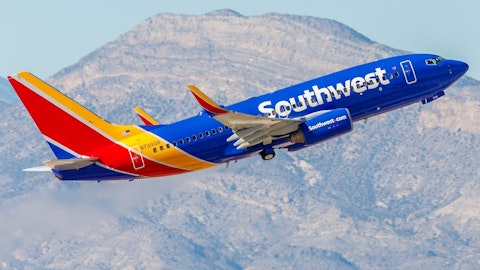Catherine O’Brien: Totally understandable. I mean just seeing some of the scenes in Seattle, it definitely seems like a unique event. So maybe just one then. Great to have most of the fleet transition behind you. Can you just help us think about some of the moving pieces on the P&L for this year, underlying your full year CASMex guidance I know you mentioned some elevated training in your prepared remarks, Shane, but anything else we should be thinking about that as go-forward might roll off, that’s unique to the fleet transition Alaska.
Shane Tackett: Yes. I don’t think there’s anything sort of major — a lot of the expenses related to returning the lease aircraft we took through special last year. So we don’t expect a lot of noise this year in the P&L related to the fleet transition. The biggest cost piece is that we’re completing the transition training of pilots by and large in the first quarter, slipping a tiny bit into the second quarter. But that’s really it in terms of fleet transition-related specific costs in the P&L. I don’t think anything else is different than what you’ve seen across most of the industry. We have airport costs that remain an area of growth in terms of the P&L. I think that’s consistent with the entire industry. And then certainly, labor costs have gone up structurally. And as we grow, they’re going to continue to go up as we hire more people to fund that growth. But everything else looks pretty normal, I would say, in terms of trend, nothing to really point out.
Operator: And we’ll go next to Helane Becker with Cowen & Company.
Helane Becker: Just one quick clarification on that last point, Shane. The $120 million in the fourth quarter, then is that the end of the transition costs? Is that the way we think about that?
Emily Halverson: Helane, this is Emily. So the $120 million that you saw in special charges in Q4 should be most of the remainder because we’ve put all of our estimates in for returning all the A320s. We’ve done all the accelerated depreciation and other charges that we’re going to take on both the Q4 and the A320s. Those aircraft actually leave our property over the next 12 to 18 months. So there could be some minor true-ups that come through there. the last remaining thing that you’re going to see coming through special charges in 2023 is going to be whatever we end up doing with the A321s, which are still on our books. So there will be some dollars there, but there should not be much more for A320.
Helane Becker: Okay. That’s very helpful. And then just on the mileage plan. I think there was an announcement that there are new benefits that are accruing to your members beginning like I want to say around now. Maybe, Andrew, can you talk about that and how that should benefit your revenue line?
Andrew Harrison: Yes. Thanks, Helane. So 2 things. Certainly, for our loyalty guest members, there is some really cool incremental benefits as it relates to bonus miles for subscriptions, boarding priorities. And even if you hold Bank of America accounts, you’ll get bonuses there. So there’s a lot of good things there. I think specifically for Air Group, a couple of things for new cardholders, there’s going to be some minimum spend thresholds, which we’ve never had before. So I think that will add to some of the quality. And then the other thing we did have a fee increase this year, which we haven’t done forever, and we’re still one of, if not the lowest card membership fee. But again, that’s . That went from $75 to $95. So we will . We get a lot of value from our card and the spend on the card is very, very healthy. So we think this is well within the industry. In fact, it’s probably low versus the industry, but we don’t have any concerns about it.




